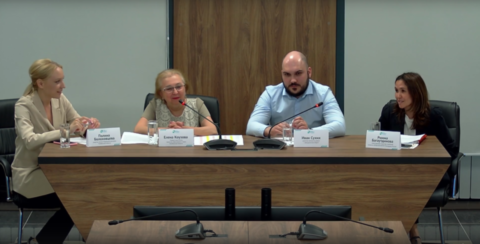The Admissions Campaign traditionally begins in all higher educational institutions of the Russian Federation on June 20th. Starting this year, all universities will accept documents not only in person, but also remotely via the Internet. What other innovations are awaiting applicants? Informational events dedicated to the start of the Admissions Campaign are being held in Chelyabinsk.
The live broadcast, which everyone interested could watch on social networks, was organized by the Regional Management Centre. Representatives of the Ministry of Education and Science of the Chelyabinsk Region and the city's universities were invited to the conversation. Ivan Sukhikh, Director of the SUSU Applicant Consultation Centre, took part in the event on behalf of South Ural State University.
This year there are 15115 graduates in the Chelyabinsk Region. The number of state-funded places in all universities in the region is 10482. Compared to last year, 100 state-funded places have been added to South Ural State University.
"In total, in all fields of study, including Bachelor's, Specialist's and Master's degree programmes, today there are more than 3100 state-funded places. There are more than 2400 places for school graduates. The number of state-funded places is increasing for the in-demand specialties: technical, scientific, and IT specialties," said Ivan Sukhikh.
As before, applicants have the right to submit documents and try to apply for a state-funded place in five educational institutions simultaneously. But now universities can choose the number of fields of study, in which the applicant can participate in the competition. There can be from three to ten of those. South Ural State University allows applicants to choose up to 10 specialties; such decision was made to give applicants the full opportunity to enrol on a state-funded basis.
All schoolchildren enter the university according to the results of the Unified State Exam, but this year there is only one compulsory subject − Russian Language. The rest of the applicants can choose an educational programme they want to study in. Also this year, only one wave of enrolment takes place. All state-funded places will be occupied in one day.
Each university, in addition to the results of the Unified State Exam, assesses the applicant's individual achievements. The results of the Olympiads, the TRP Pin, volunteer activities, or the title of Master of Sports of Russia − all this will give an advantage when entering a higher educational institution. Ivan Sukhikh advised applicants and their parents to carefully familiarize themselves with the terms for assessing individual achievements in each university, since different institutions have the right to award the number of points at their discretion.
Traditionally, there are three ways to submit documents at SUSU: in person, via the Internet in your personal account on the university web-site, or by mail. Whether there will be face-to-face admission this year depends on the epidemiological situation in the region.
If students fail to enrol on a state-funded basis, they have an opportunity to enrol on a contractual basis. However, the decision on the pricing policy has not yet been made at SUSU. The information will appear after the meeting of the University Council next week.
Applicants and their parents can address their questions to the specialists of the SUSU Applicant Consultation Centre, which starts to work on June 20th. Last year, over 2.5 months of its work, more than 1000 consultations were held by phone, e-mail, via video conference, chat, and through social media platforms.
The Press Centre of the Argumenty i Fakty − Chelyabinsk newspaper held an online conference on the admissions campaign in secondary vocational institutions of the Chelyabinsk Region. More than 90 thousand students of the Chelyabinsk Region are currently obtaining education in secondary vocational educational institutions. About half of schoolchildren decide to go to vocational institutions and secondary technical schools after the end of the 9th grade.
Olga Prokhorova, Director of the Multidiscipline College of the SUSU Institute of Sport, Tourism and Service, who had been invited to the event, spoke about the educational programmes implemented at their institution.
"We are recruiting students for such specialties as Tourism, Economics and Accounting, and Law Enforcement. The latter specialty is very popular with both ninth- and eleventh-grade pupils," says Olga Prokhorova. "In 2020, more than 260 applicants came to study in this field."
Upon completion of training, the student receives the qualification of a lawyer. Graduates work in courts of general jurisdiction; in bailiff services, public defender's offices, notaries; in detective agencies; in Rosgvardia, law enforcement agencies as district police officers, assistants to criminal investigators, employees of the Police Patrol and Checkpoint Service.
"The Multidiscipline College of the SUSU Institute of Sport, Tourism and Service has been on the educational services market for over 45 years now. We are a structural subdivision of SUSU and closely collaborate with the university. We orient our students towards further higher education, as we understand that this makes it possible for them to build a successful career. College graduates continue their studies at the schools and institutes of South Ural State University," says Olga Prokhorova.
This year, applicants can apply for admission to secondary vocational educational institutions, as well as to universities, in electronic format. However, according to a participant of the conversation, Olga Statirova, Head of the Department of Vocational Education of the Ministry of Education and Science of the Chelyabinsk Region, this format is not popular among applicants and their parents. They prefer to come and speak personally with the academic staff in order to make the final decision on the choice of a specialty.
The participants of the press conference agreed that secondary vocational education has long ceased to be an option for low-performing students; schoolchildren with good results in final exams purposefully go to vocational institutions and technical schools. They successfully participate in various competitions and Olympiads, continue their studies at universities after graduating from a secondary vocational institution, improving their knowledge in the chosen specialty. It should be mentioned that admission to the organisations of secondary vocational education will last until August 15th.




